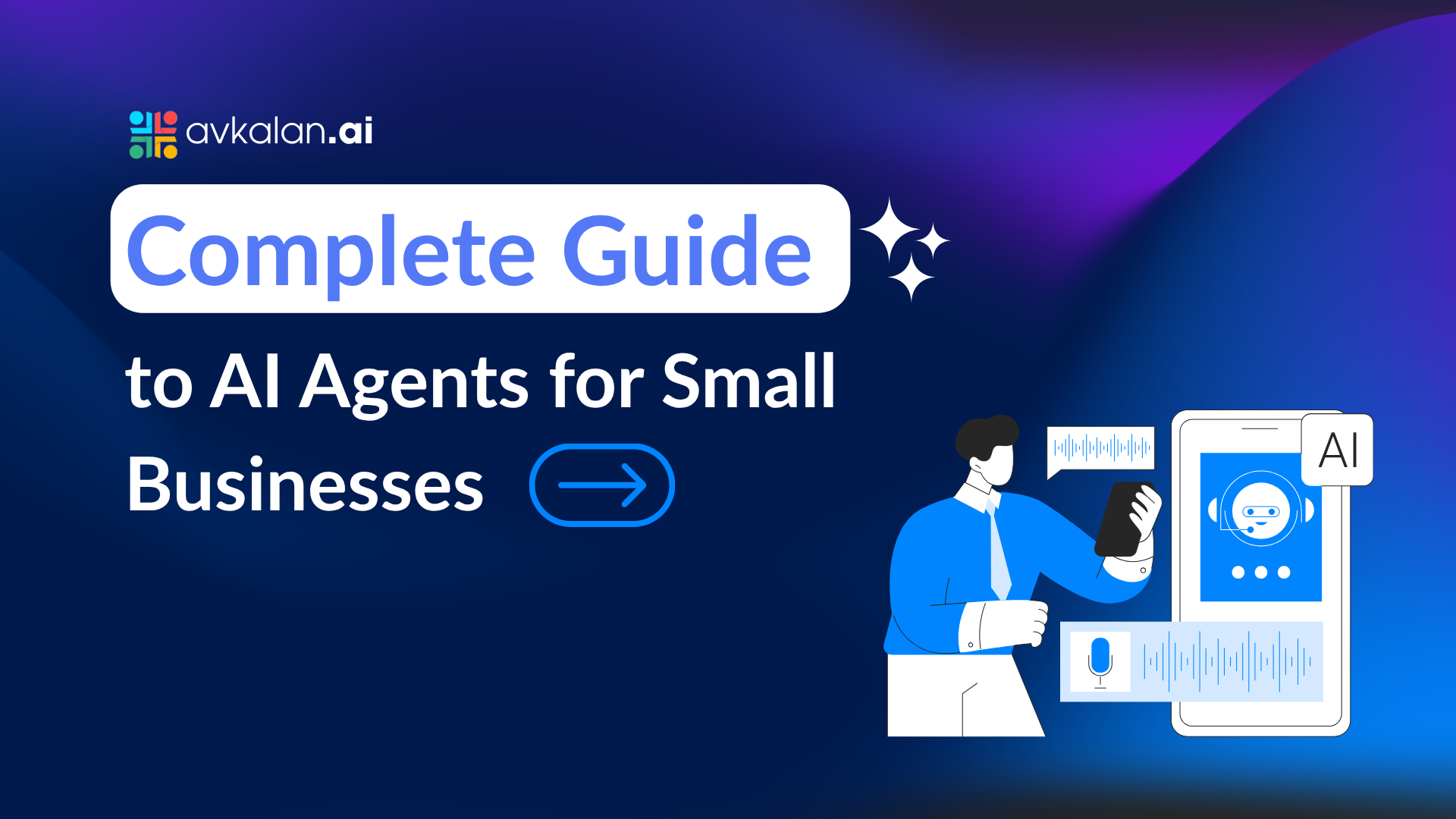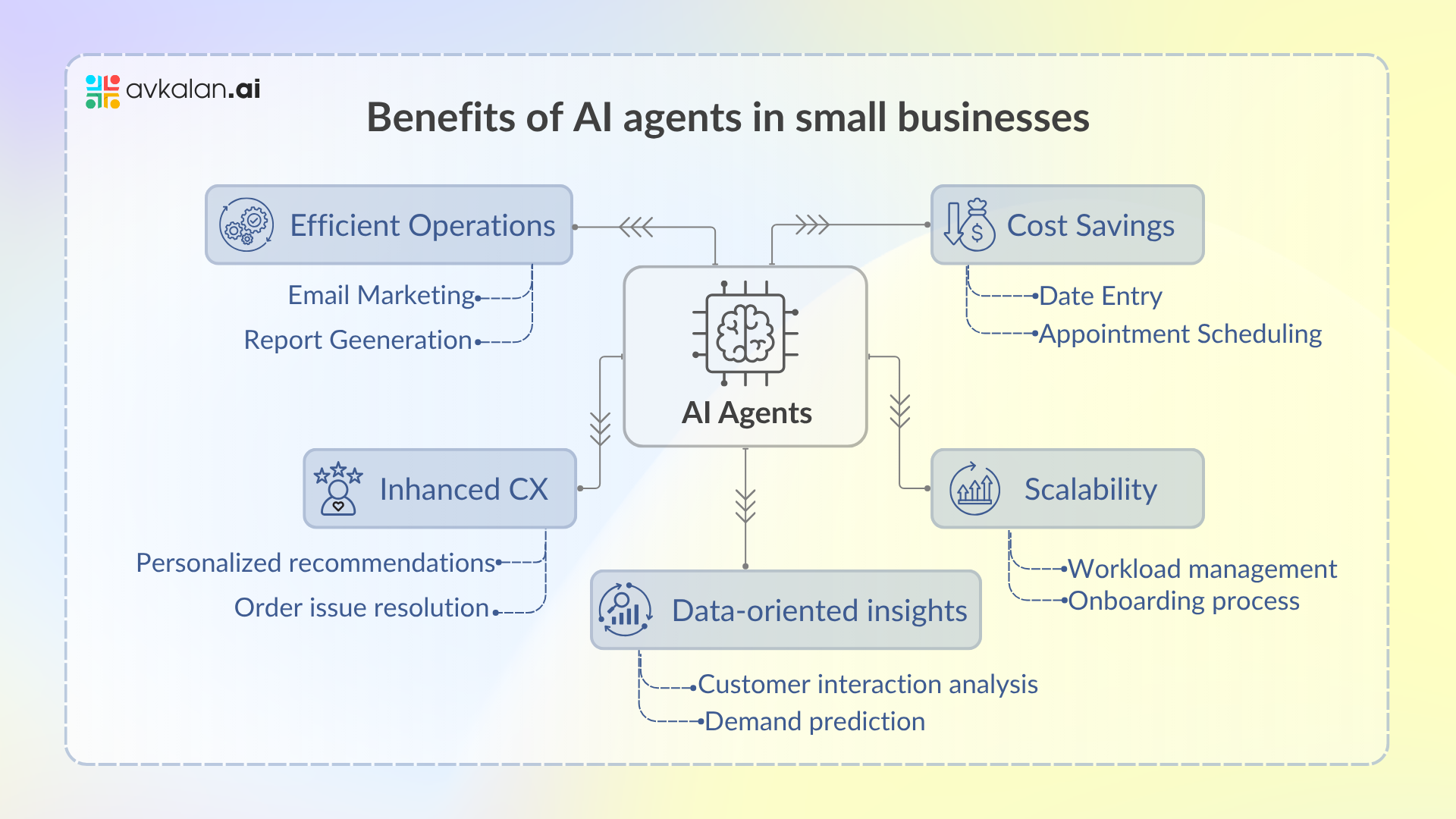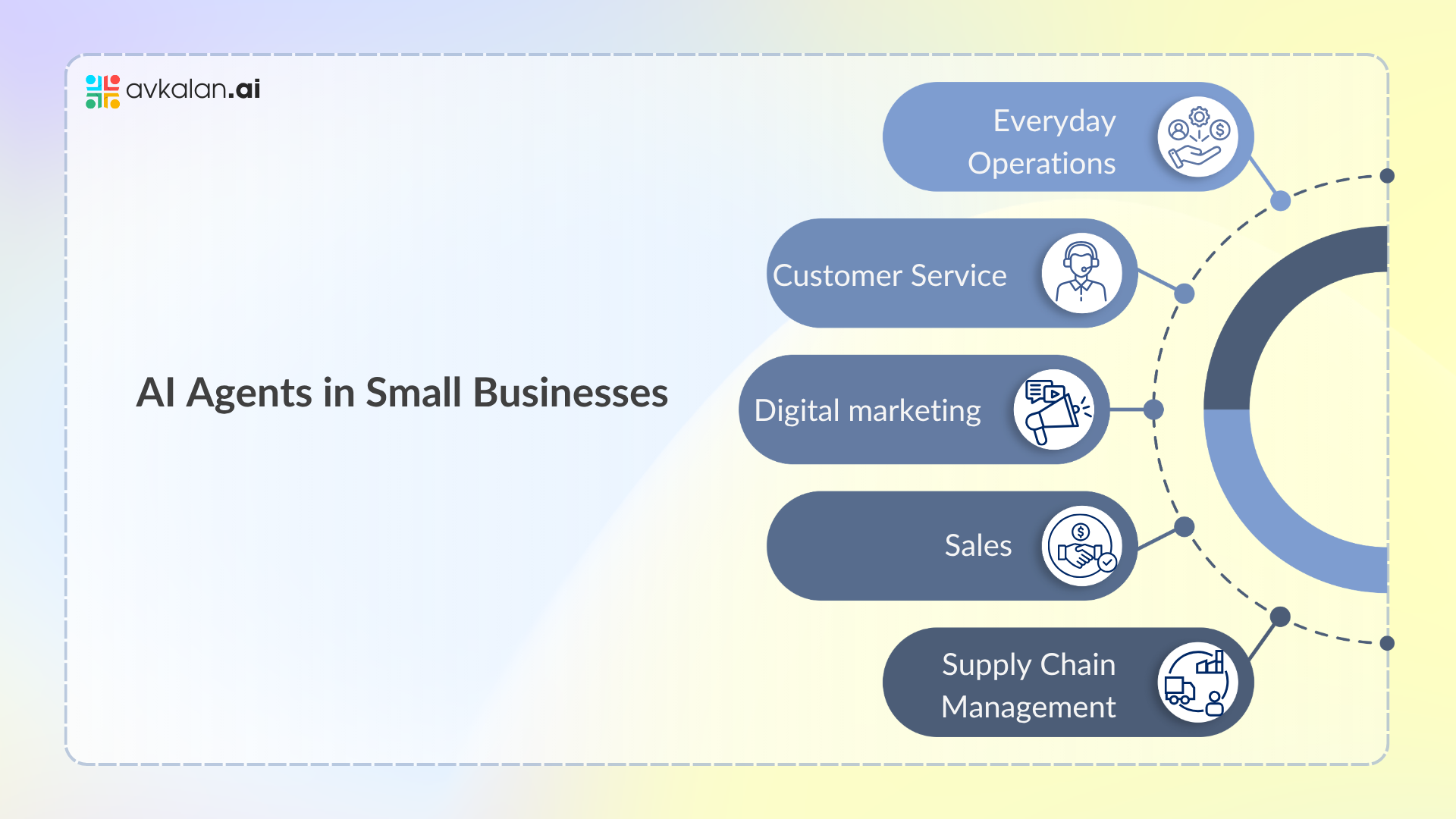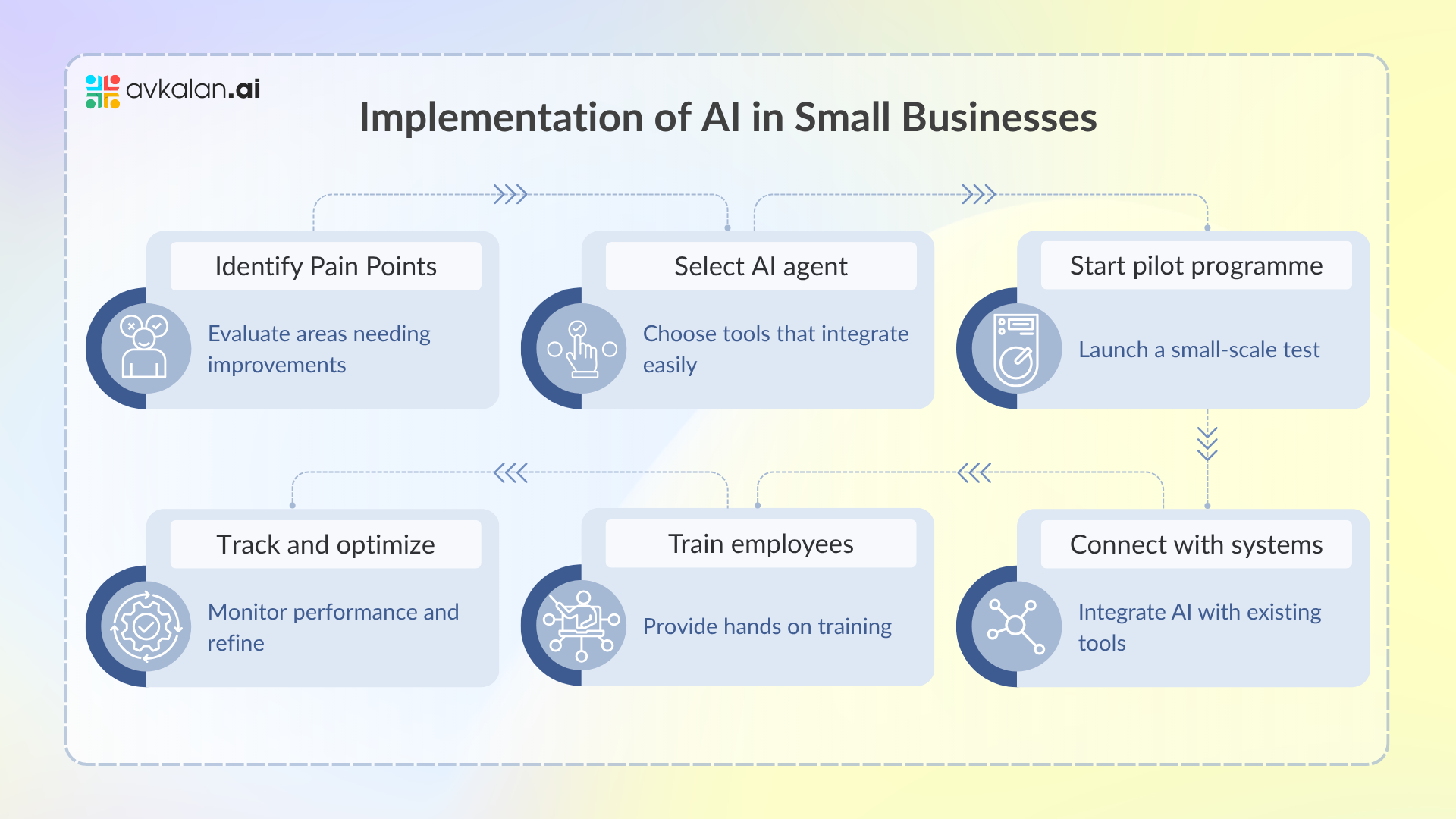
A small business tends to require all employees to perform diverse activities with limited resources and time. With AI agent implementation, businesses can do exceptional multitasking. Such digital assistants can perform the most time-consuming repetitive activities, from replying to customer queries and automating marketing tasks, because of which teams free up and can work on the most important activities. When using AI agents, small businesses can use the best tools to function and scale quickly and offer excellent UX with limited resources.
Do you want to use AI agents for your business but can’t understand how to start? Here, we will share the guide to implementing AI agents for your small business. Before that, let’s outline what they are, how small businesses use them, the benefits of using them, and use cases. Keep reading.
What are AI Agents?
AI agents are smart software solutions that use AI to streamline everyday operations. So, small businesses can work more effectively with AI implementation by not making extra employees work.
How Small Businesses Use AI Agents
Small businesses implement AI agents to generate revenues as such systems may automate everyday activities, like managing follow-ups. Since AI agents can design marketing elements, you can increase your brand recognition without having a dedicated creative team. AI agents can identify opportunities for improvements in operations by evaluating data patterns. Small businesses can maintain the optimum stock levels and fix issues before they get more critical.
Benefits of AI Agents for Small Businesses
Here are the key benefits of using AI agents for small businesses:

- Efficient Operations : AI tools can quickly finish tasks that are quite time-consuming for humans, such as managing email marketing campaigns and generating reports. For instance, a store can save hours in manual inventory tracking with an AI agent.
- Cost Savings : Automating activities, such as data entry and scheduling appointments, decreases the requirements to hire skilled employees. An AI chatbot instantly replies to customer queries, and because of this, you don’t need to hire extra staff.
- Scalability : AI agents upgrade with businesses by managing heavy workloads without new recruits. AI automation may streamline the onboarding process in a company, which helps teams scale operations without including extra employees.
- Enhanced CX : AI agents help businesses offer personalized CX, which helps in satisfying and retaining maximum customers. Online retailers using AI chatbots can immediately recommend products depending on browsing history and fixing order issues.
- Data-Oriented Insights : AI-activated analytics convert customer interactions to helpful information, which helps businesses modify their strategies and make smart decisions. They keep in-demand products in stock after evaluating buying trends and stock turnover. The data-centric approach boosts demand prediction and supply chain activities.
AI-Agents Implementation for Small Businesses
Here are the different niches in which small businesses implement AI agents:

- Everyday Operations : Small businesses tend to have limited resources, which makes it necessary for them to streamline everyday operations. AI agents increase operational efficiency, automate repetitive activities, manage data, and share actionable insights. The AI may also generate timelines for all projects, which helps the team to stay updated with deadlines.
- Customer Service : Delivering consistent, satisfactory services is challenging for many small businesses. AI agents can easily maintain and improve customer communications. Chatbots help in bridging the communication gap, replying to customer queries, and always giving quick responses, which ensures customers always feel appreciated. Once customers buy any products, the AI agents may follow up with a “Thank You” email and care instructions for the new product or discount code for the next visit.
- Digital Marketing : Digital marketing includes using multiple strategies and channels with less manpower. Such tools help in creating social media posts and personalizing branded elements depending on a brand’s voice and target audience. As you evaluate marketplace trends and customer data, businesses can do promotions and increase outreach. Chatbots interact with target customers on social media and websites.
- Sales : Following efficient sales strategies get difficult with less time and resources for small businesses. AI sales agents easily automate tasks, such as customized sales pitches and lead pitches. AI agents evaluate customer data and elaborate on the leading trends, which helps businesses personalize pitches to target audiences. With AI agents, businesses can do outlines, personalize proposals, and easily close deals.
- Supply Chain Management : Small businesses tend to find it difficult to manage suppliers, logistics, and inventory. AI agents simplify such activities by implementing POS systems, supplier databases, and stock management software to streamline operations and deliver actionable insights. AI agents automatically update inventory counts as products are sold by integrating them into the POS system. AI evaluates seasonal data and sales trends to predict demand and prevent scarcity of resources. AI agents may identify supply delays and inconsistencies by evaluating shipment data and delivery. The AI may suggest other suppliers to maintain easy operations if issues are detected.
How to Implement AI Agents for Your Small Business
Implementing AI agents may be challenging for small businesses. Follow these steps below to implement AI agents easily in your small business:

1. Find Out Pain Points
Evaluate the areas where your small business may benefit the most. Identify repetitive activities, such as appointment scheduling and data entry, where a quick response may help you stay competitive. You should ask yourself which tasks require maximum manual effort, which areas have the most common errors/delays, and processes that may benefit from real-time information or quicker responses.
2. Select the Correct AI Agent
Choosing the right agent for small businesses is crucial to maintaining functionalities at minimum costs. Find tools that can merge easily with the current platforms, such as direct CRM or POS systems, and don’t need much IT support or full-time experts. Consider comparability, user-friendliness, and scalability when choosing the right system. Ensure it integrates smoothly with current systems (such as CRM and POS) and can manage heavy workloads with the business growth.
3. Start a Pilot Program
Launching a less risky pilot program helps small businesses to manage staff resources and budgets. A store can use a chatbot to reply to FAQs and track the accuracy of responses. You will have to confirm that AI offers high value before full-scale integration.
4. Connect With Current Systems
Small businesses tend to use cost-effective and user-friendly tools, such as CRM and POS. You should use an AI agent that can integrate with the existing systems, such as POS software, CRM tools, and email platforms. POS software helps in tracking real-time inventory and sales. CRM tools help in managing customer data and delivering insights. Email platforms can personalize outreach and automate follow-ups.
5. Train Your Employees
Small business employees tend to do different jobs. You should deliver hands-on training and documentation so your employees quickly learn to utilize AI agents and fulfill other job responsibilities.
6. Track and Optimize Performance
After starting to use an AI agent, monitor performance and get feedback. Implement chatbot analytics to identify the areas that require improvement. If a Chatbot is not replying to certain customer queries, you should refine responses. Modify content development or targeting strategies to increase email open rates.
Use AI Agents to Grow Your Small Business
Small businesses are leaving no stone unturned to grow and supersede their competitors. With the proper implementation of AI agents, you can always take your business to the next level. A professional AI service provider can always understand your business needs and guides you to implement AI agents perfectly. Hopefully, this post guided you in how to use them in the best ways to boost operations and grow your small business consistently.
